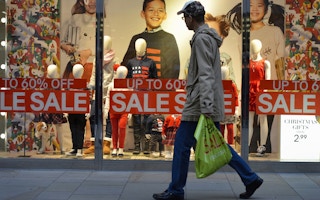There is no escaping the fact that shopping season is upon us; stores declare their oversized discounts on equally oversized signs on display windows, newspapers bulge with inserts boasting the best deals, junk mail folders contain double the number of pages and exclamations promising huge savings.
To continue reading, subscribe to Eco‑Business.
There's something for everyone. We offer a range of subscription plans.
- Access our stories and receive our Insights Weekly newsletter with the free EB Member plan.
- Unlock unlimited access to our content and archive with EB Circle.
- Publish your content with EB Premium.
From these indications alone, one would think the driving force of today’s civilisation involves relentless, if not indiscriminate, consumption. If there is one thing that an environmentally-responsible business grapples with, it is toeing the line at increasing profit margins without creating excess need and output. How do you develop a viable business model that balances profit growth viability with eco-consciousness?
The answer, it seems, might lie in “anti-marketing”. Consider REI, a company that sells outdoor sport equipment via a co-op system in which members (instead of shareholders) can purchase products and also receive dividends (in lieu of discounts) at the end of each financial year. This year, instead of enticing members via sale prices, the company is opting to close its stores on Black Friday (traditionally the busiest shopping day of the year in the US) with the message to its workers to spend the day outdoors.
While directly and overtly contradicting its raison d’etre as a business that relies on profit from sales, it has tapped into the collective eco-consciousness of its members, garnering not just support for this idea but also fostering brand loyalty. By declaring itself above the more tawdry and mercenary principles behind this capitalistic holiday, it has in turn made it more attractive to a growing pool of potential customers, a new demographic that is learning to abandon wasteful spending for spending’s sake.
Such tactics are not new. In 2011, Patagonia engaged in an even more direct campaign to effect a change in the spending habits of its customers. Its “Don’t Buy This Jacket” ads exhorted customers to “[not] buy what you don’t need” and “think twice before you buy anything”, flying in the face of the “spend now ask questions later” mindset carefully cultivated by generations of exploitative sales tactics in the modern capitalist climate.
It was a bold strategy that defied that not only traditional marketing concepts but also signaled a change in the consumer subconscious. It demonstrated a respect for the consumer’s thought process by acknowledging its own part in the use of limited resources of the planet, while also imploring customers to have the bigger picture in mind outside of the long-established capitalist culture of discounts and instant gratification. It was a gamble that paid off; according to Bloomberg, its sales grew 40 per cent in the two years that followed.
While directly and overtly contradicting its raison d’etre as a business that relies on profit from sales, it has tapped into the collective eco-consciousness of its members, garnering not just support for this idea but also fostering brand loyalty.
Putting aside the paradoxical implications of the campaign’s purpose versus the company’s bottom line, this increase indicates that more customers are choosing a more environmentally responsible lifestyle with their pocketbooks, and that is good news indeed for shareholders as well as for the planet.
If this success is anything to go by, it challenges age-old notions of how to do business in a world so precariously balanced between demand, supply and the limited nature of the planet’s resources. Selling is no longer a simple equation of increasing or creating want; it is now a lesson in understanding that the customer is not an unthinking well of buying power to draw from, but a complex force acting on push-pull factors far beyond desire.
This is perhaps the sea change in marketing strategy, a business-led paradigm shift, that can bring about real climate-conscious consumerism and lead us out of the herd-driving, mass-spending habits we don’t know how to break out of.











